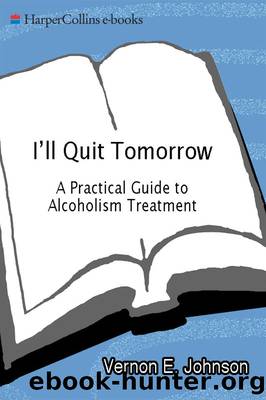I'll Quit Tomorrow by Vernon E. Johnson

Author:Vernon E. Johnson
Language: eng
Format: epub
Publisher: HarperCollins
Published: 2013-10-15T00:00:00+00:00
10.
Rehabilitation
âJust the kind of day that used to drive me to drink.â
âHow did what you just said make her feel?â
The outpatient aftercare program of therapy actually begins during the first days of intensive treatment. This happens in two ways. As soon as patients have passed through detoxification, they start to learn about their disease and progressively more and more about themselves. In addition to comprehensive information, they are given a very specific set of tools, which are immediately helpful but will also continue to be essential during outpatient rehabilitation; inpatient group therapy is designed to get patients back in touch with themselves, and also teaches them to trust group experiences. They now have more personal insight and can use this new skill in the outpatient group in which they expect to continue to grow. They know the chronic nature of their illness and accept the need to move more deeply and consistently into increasingly meaningful and open interpersonal relationships. They can take ârisks.â (See Appendix G.)
But there is another very basic way in which outpatient treatment begins at the inpatient level. From the beginning, careful consideration is given to the spouse. If there is a mate, that wife or husband is the other vital half of the alcoholic situation. The spouse takes part in the inpatient treatment program as an outpatient from the very start. During the first days, he or she helps provide the essential information or data that will assist in determining the severity of the illness. Later, at appropriate times, the spouse will be called upon to confront the patientâs defense systems. Characteristically, when the treatment of the alcoholic has âplateaued,â the patient may again hide behind minimizing and rationalizing, and at that point the spouse can be brought in to confront the alcoholic in person with âhow it really was.â Nevertheless, from the very beginning he or she is also urged to attend every lecture possibleâthose in the evenings at least; to read the recommended literature carefully; and to attend the weekend orientation sessions.
Letâs follow a typical spouse through the outpatient role.* Joeâs wife Linda is enrolled in the outpatient âspouseâ group, where she learns the goals and dynamics of group life. More especially, she learns that she herself needs help for her own emotional distress. She is confronted with her own highly developed and inordinate defense systems and negative emotional postures, and begins to recognize and accept them while the patient is in the hospital. There is the startling realization that the mate of the wet drunk is a dry drunkâa sort of mirror image of the alcoholic. The nonalcoholic or even abstemious spouse will show almost all the symptoms of the disease except the physical deterioration caused by ethel alcohol.
One of her greatest problems is in the area of repression. The wife of the alcoholic has not only repressed many of her most painful memories, but more seriously, she has almost certainly repressed her negative feelings and attitudes as well. She has lost touch
Download
This site does not store any files on its server. We only index and link to content provided by other sites. Please contact the content providers to delete copyright contents if any and email us, we'll remove relevant links or contents immediately.
| Adult Children of Alcoholics | Alcoholism |
| Drug Dependency | Gambling |
| Hoarding | Obsessive Compulsive Disorder (OCD) |
| Sexual | Smoking |
| Substance Abuse | Twelve-Step Programs |
The Hacking of the American Mind by Robert H. Lustig(4375)
Right Here, Right Now by Georgia Beers(4197)
Fingerprints of the Gods by Graham Hancock(3991)
Goodbye Paradise(3798)
Bad Pharma by Ben Goldacre(3421)
Happiness by Matthieu Ricard(3040)
More Language of Letting Go: 366 New Daily Meditations by Melody Beattie(3018)
The Social Psychology of Inequality by Unknown(3017)
The Plant Paradox by Dr. Steven R. Gundry M.D(2611)
Drugs Unlimited by Mike Power(2590)
Confessions of a Shopaholic by Sophie Kinsella(2343)
Borders by unknow(2301)
Make Love Not Porn by Cindy Gallop(2103)
Dry by Augusten Burroughs(2096)
Stop Being Mean to Yourself: A Story About Finding the True Meaning of Self-Love by Melody Beattie(1987)
Getting Off by Erica Garza(1930)
Belonging by Unknown(1854)
Yoga and the Twelve-Step Path by Kyczy Hawk(1833)
Unmasking Male Depression by Archibald D. Hart(1808)
